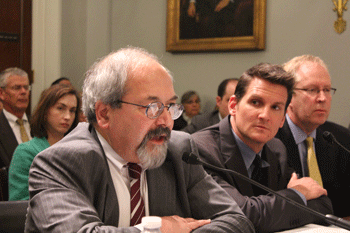A little bit of policy, a little bit of rock and roll
Add Summary
Environmental policy got a touch of rock star this week when MSU executive in residence Mark Rey testified in defense of legislation seeking to stem illegal logging.
Oh, and Adam Gardner from Guster was at his side.
 Both Rey and Gardner were testifying at the House Natural Resources subcommittee hearing on two bills that would repeal portions of the Lacey Act. The century-old environmental law in part bars importing wood that is illegally exported under another country's laws.
Both Rey and Gardner were testifying at the House Natural Resources subcommittee hearing on two bills that would repeal portions of the Lacey Act. The century-old environmental law in part bars importing wood that is illegally exported under another country's laws.
The Lacey Act came under fire after federal agents raided the facilities of Nashville-based Gibson Guitar last summer, which was accused of crafting the legendary instruments with illegally harvested and exported wood. Last September, Rey was quoted in the Los Angeles Times noting that small flaws aren’t reason enough to attack an otherwise beneficial act.
Backers say that one of the act’s key provisions prevents American companies from buying illegal wood from other countries. Trade in such wood promotes deforestation and makes it more difficult for American lumber companies to compete, they say.
“Bans and restrictions on exports of raw materials are common in tropical countries and are directly linked to forest management and protection efforts,” Rey testified. “In countries where corruption is common or where there is weak governance, these laws are an important tool in controlling large exports of illegally logged timber.”
Gardner is a co-founder of the nonprofit group Reverb, which works with bands on making their tours more environmentally sustainable. He talked to the New York Times Green blog about his work.



 Print
Print Email
Email
